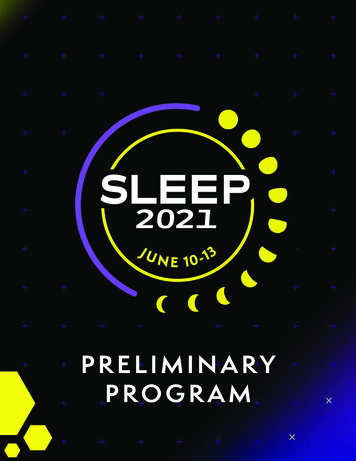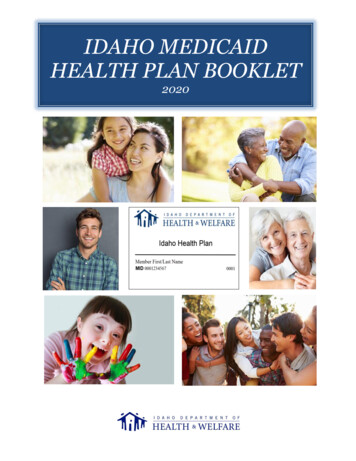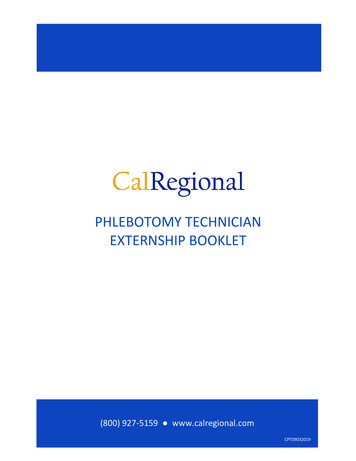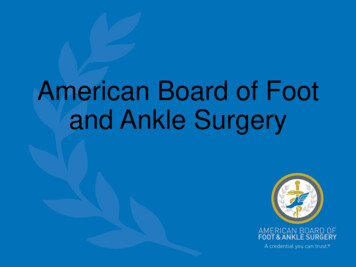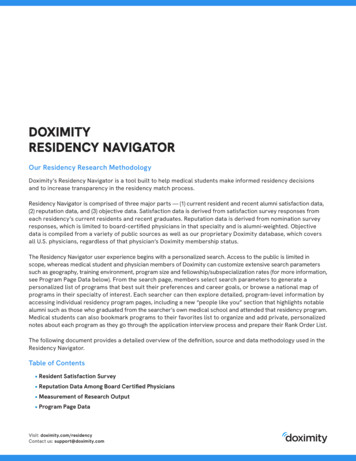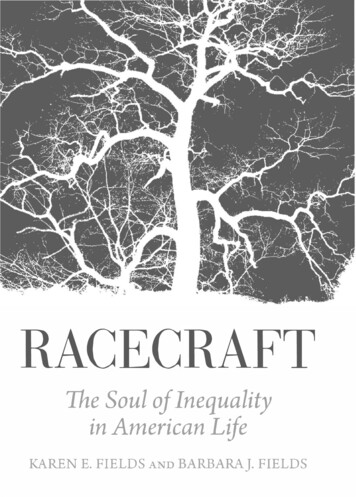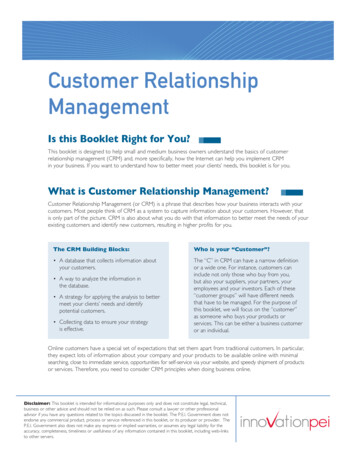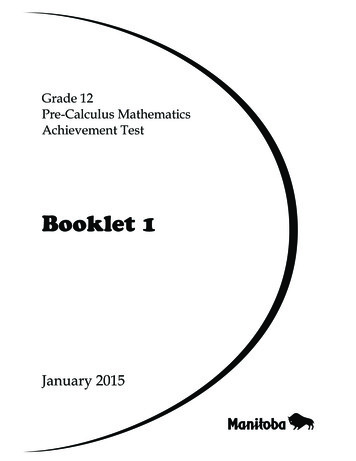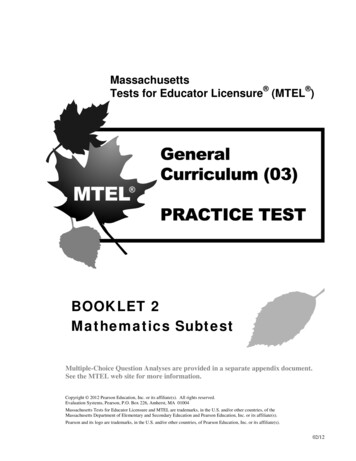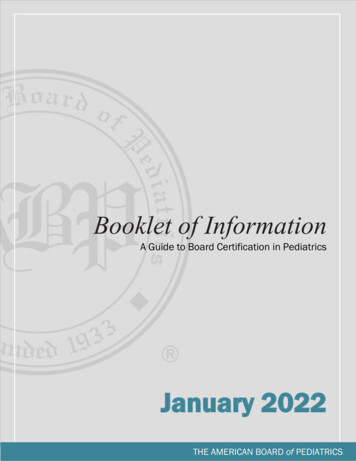
Transcription
Booklet of InformationA Guide to Board Certification in PediatricsJanuary 2022THE AMERICAN BOARD of PEDIATRICS
TABLE OF CONTENTSABP VISION, MISSION, VALUES, AND GUIDING PRINCIPLES. 32022–2023 CERTIFYING EXAMINATIONS AT A GLANCE. 4GENERAL EXAMINATION ADMISSION REQUIREMENTS . 5Graduation from Medical School . 5Training Requirements . 5Accreditation of Training Programs . 5Osteopathic Pediatric Training and Eligibility for ABP Certification . 6Licensure Requirements . 6SPECIAL TRAINING SITUATIONS . 6Credit for Previous Training . 6Waiver of Accredited Training – Policy Regarding Individuals with Nonaccredited Training . 6Absences from Residency Training. 7Credit for Previous General Pediatrics Residency Training After an Interruption . 8Nonaccredited Training Experience . 8Military Service . 8Veterans Administration (VA) GI Bill Benefit. 8SPECIAL TRAINING PATHWAYS . 8Training in Pediatrics – Neurology . 8Training in Pediatrics – Neurodevelopmental Disabilities . 9Accelerated Research Pathway . 9Accelerated Research Pathway in Allergy-Immunology . 10Integrated Research Pathway . 10Special Situations . 10COMBINED PROGRAMS . 11TRACKING AND EVALUATION FOR RESIDENTS AND FELLOWS . 12Unsatisfactory Clinical Competence . 12Marginal Clinical Competence . 13Unsatisfactory Professional Evaluation . 14Verification of Training by Pediatric Program Directors . 14Physician Competencies . 14Appeals Process . 15INFORMATION FOR ALL CERTIFYING EXAMINATIONS. 162022 GENERAL PEDIATRICS CERTIFYING EXAMINATION DATES AND FEES . 17CERTIFICATION IN THE PEDIATRIC SUBSPECIALTIES . 19Subspecialty Certificates . 19Subspecialty Fast-Tracking. 20Training Leading to Dual Pediatric Subspecialty Certification . 20Training Leading to Eligibility for Combined Subspecialty Certification . 20Subspecialty Examination Admission Requirements . 202022-2023 SUBSPECIALTY CERTIFYING EXAMINATIONS DATES AND FEES . 21CONTINUING CERTIFICATION . 22POLICIES . 23Page 2 of 23THE AMERICAN BOARD of PEDIATRICS
ABP VISION, MISSION, VALUES, AND GUIDING PRINCIPLESThe vision, mission, values, and guiding principles of the ABP inform all of our work.VisionInspiring a lifetime pursuit of learning to improve child healthMissionAdvancing child health by certifying pediatricians who meet standards of excellence and are committed tocontinuous learning and improvementValues Consistency: Making unbiased decisions based on published ABP policies Excellence: Striving to do our best work Reliability: Living up to responsibilities and commitment Transparency: Sharing non-confidential information openlyGuiding PrinciplesOverarching Principle: The “North Star” for the ABP is and will remain the improvement of health outcomes forchildren, adolescents, and young adults.Page 3 of 23 The ABP is primarily accountable to children, from infants to young adults, and their families as itguides professional self-regulation and certifies pediatricians. ABP certification recognizes pediatricians who meet rigorous standards for competencies essential toimproving child health. The ABP supports best practices for the assessments of all core competencies using tools that are fair,valid, reliable, and contribute to lifelong professional development. The ABP prioritizes work that the organization is uniquely positioned to do. The ABP strives to align opportunities for continuing certification with pediatricians’ professionalpractice. The ABP continually evaluates and improves its work based on changing trends in child health,stakeholder feedback, and advances in knowledge, assessment, technology, and care delivery. The ABP engages in open dialog with pediatricians, patients and families, and other members of thepublic. The ABP seeks out and respects diverse backgrounds, experiences, and perspectives to inform itswork. The ABP collaborates with other regulatory bodies, medical organizations, and professional societies toalign accreditation and certification across the continuum from training through practice.THE AMERICAN BOARD of PEDIATRICS
2022-2023 CERTIFYING EXAMINATIONS SCHEDULE AT A GLANCE(Exams administered at computer testing centers)The fees for certification in general pediatrics and the pediatric subspecialties are payable only in United States(U.S.) dollars. The payment is required using a VISA, MasterCard, or American Express credit card. If you are usinga debit card, please confirm that the transaction limit established by your bank is sufficient to cover the fee. TheAmerican Board of Pediatrics (ABP) reserves the right to make changes in its fees, policies, and procedures at anytime and will make every effort to give advance notice when such changes are made. It is the applicant’sresponsibility to be aware of and to meet all deadlines. All applications must be submitted online.CERTIFYING EXAMREGISTRATION PERIOD(ends at 3 p.m. ET on final day)EXAM DATESGeneral PediatricsRegular Registration:January 14, 2022–March 31, 2022October 11–13, 2022Candidates will take the exam on asingle day in the three-day examperiod.Late Registration:April 1, 2022–May 16, 2022Adolescent MedicineNeonatal–Perinatal MedicinePediatric NephrologyChild Abuse PediatricsSports MedicineMedical ToxicologyPediatric CardiologyHospice and Palliative MedicinePediatric Critical Care MedicinePediatric Transplant HepatologyPediatric Hospital MedicinePediatric PulmonologyRegular Registration:August 2, 2021–September 30, 2021Late Registration:October 1, 2021–October 29, 2021Regular Registration:February 1, 2022–March 31, 2022Late Registration:April 1–29, 2022March 24, 2022March 29, 2022March 30, 2022March 30, 2022July 12–16, 2022October 20, 2022November 1, 2022November 1, 2022November 3, 2022November 3, 2022November 8–9, 2022November 29, 2022Pediatric Emergency Medicine,Pediatric Hematology–Oncology,Developmental–Behavioral Pediatrics,and Pediatric RheumatologyTBDSpring 2023Pediatric Infectious Diseases,Pediatric Endocrinology, PediatricGastroenterology, Sleep Medicine,and Sports MedicineTBDFall 2023IMPORTANT: Computer technical difficulties, operator error, or difficulties arising from username orpassword problems (e.g.,forgotten password or inability to log on to the ABP application system due toan inconsistency with the spelling of names) must be resolved and the application completed andsubmitted before the 3 p.m. Eastern Time deadline. Please be aware that it can take up to 48 hours(excluding weekends) to resolve certain technical difficulties. The ABP makes every effort to assist withthese issues promptly; however, applicants are responsible for verifying their ability to apply wellbefore the deadline. No exception will be allowed for applicants who miss the application deadline.Page 4 of 23THE AMERICAN BOARD of PEDIATRICS
GENERAL EXAMINATION ADMISSION REQUIREMENTSAn applicant1 requesting admission to a certifying exam must meet the following general requirements.Graduation from Medical SchoolThe applicant must be a graduate of a medical school that has been accredited by the Liaison Committee onMedical Education (LCME) in the U.S., by the Royal College of Physicians and Surgeons of Canada (RCPSC)2 inCanada, or by the American Osteopathic Association (AOA) in the U.S. Applicants who are graduates of medicalschools outside the U.S. or Canada that cannot be accredited by the LCME, RCPSC, or AOA, but is listed by theWorld Health Organization, may apply for the exam if they have a standard certificate either from the EducationalCommission for Foreign Medical Graduates (ECFMG) or the Medical Council of Canada. A copy of the ECFMGcertificate must be submitted to the ABP after submission of the application. Graduates of a medical school not accredited by LCME, RCPSC, or AOA must also submit to the ABP aphotocopy of the medical school diploma showing the medical degree and the date it was awarded. Acertificate showing that the applicant has passed a final exam is not acceptable.Training RequirementsApplicants must complete three years of pediatric training in programs accredited by the Accreditation Council forGraduate Medical Education (ACGME) or in programs in Canada accredited by the RCPSC. The ABP recognizesand defines these three levels of pediatric training (R-1 through R-3) as follows: R-1: The first postgraduate year in general comprehensive pediatric training in an accredited program. R-2: The second postgraduate year, following R-1, in general comprehensive pediatric training in anaccredited program, but with increased responsibility for patient care and for the supervision of juniorhouse staff and medical students. R-3: The third postgraduate year, following R-2, in general comprehensive pediatric training in anaccredited program, but with increasing responsibility for patient care and supervision of junior housestaff and medical students.The training curriculum must be compatible with the program requirements, which are available on the ACGMEwebsite. The trainee is expected to assume progressive responsibility for the care of patients and satisfactorilycomplete at least 12 months at each training level. Refer to the section “Absences from Training” for the vacationand leave policy. Supervisory experience must be an integral part of the total three-year program. All applicantsare advised to consult the ABP before undertaking any variations in training.The ABP requires program directors to verify satisfactory completion of training and to evaluate the acceptabilityof the applicant as a practitioner of pediatrics. Please refer to the section titled “Program Directors TrainingVerification“ for details.Training completed in ACGME-I programs is not creditable toward ABP certification. Please refer to the section:“Waiver of Accredited Training — Policy Regarding Individuals with Nonaccredited Training” for more information iftraining is completed outside the U.S. or Canada.Accreditation of Training ProgramsThe ABP does not accredit training programs. The ABP approves applicants for admission to its certifyingprocess. Program requirements for residency education in pediatrics and other information may be found on theACGME website.12Throughout this document, the term candidate will be synonymous with applicant.Hereafter, accreditation will refer to accreditation by ACGME or RCPSC.Page 5 of 23THE AMERICAN BOARD of PEDIATRICS
Osteopathic Pediatric Training and Eligibility for ABP CertificationThe ABP requires that applicants for certification in general pediatrics complete three years of training in programsaccreditedby ACGME or in programs in Canada accredited by the RCPSC. In light of the agreement betweenACGME, the AOA, and the American Association of Colleges of Osteopathic Medicine for a single accreditationsystem announced in February 2014, the ABP will accept applications from individuals who have completedosteopathic pediatric residency training only if the training has been accredited by ACGME for the entire durationof required training. Training completed while the osteopathic training program either has not applied foraccreditation by ACGME or has applied and has the status of pre-accreditation cannot be used to fulfill therequirements for certification by the ABP.Licensure Requirements (Refer to the “Licensure Policy”)Applicants requesting admission to a certifying exam must have a valid (current), unrestricted allopathic and/orosteopathic medical license to practice medicine in one of the states, districts, or territories of the U.S. or aprovince of Canada. If licenses are held in more than one jurisdiction, all licenses held by a physician should meetthis requirement. Temporary and training licenses are not acceptable to meet the licensure requirement.The ABP does not accept medical licenses from countries outside of the U.S. or Canada to meet the licensurerequirement for any initial certifying exam.Please refer to the section titled “2022 General Pediatrics Certifying Examination Registration Dates and Fees”for licensure deadlines.If an applicant has any action pending regarding the right to have an unrestricted license to practice medicine,admission to the exam may be denied. Please refer to “Licensure Policy” for additional information.SPECIAL TRAINING SITUATIONSCredit for Previous TrainingA physician transferring to pediatric residency training from another accredited residency (e.g., family medicine,internal medicine, transitional year) must correspond with the ABP to determine whether partial credit may beawarded for this training. Credit is applied to the R-1 year of training. Requests for credit must be submitted eitherby the candidate or the pediatric residency program director before the candidate enters pediatric residencytraining. Training completed more than 24 months prior to the request requires additional review and may not becredited.Waiver of Accredited Training — Policy Regarding Individuals with Nonaccredited TrainingThe ABP has established requirements for a physician who has had at least three years of general comprehensivepediatric training in programs not accredited by the ACGME or RCPSC (i.e., international training or training inaccredited osteopathic programs in the U.S.) who wishes to apply for a waiver of training. The interested physician,department chair, or program director must write to the ABP before training begins to receive approval.The individual must provide documentation of the successful completion of at least three years of generalpediatric residency training that includes the actual beginning and ending dates of the training and that is signedby the residency program director. The individual must also provide a copy of his or her medical school diplomaand ECFMG certificate. Suggested training for those who receive a waiver of training under this policy is availableon the ABP website. Upon review and confirmation by the ABP of this information, the individual may have oneyear of accredited training waived. If a waiver is granted, 24 months of general pediatrics training must becompleted in a program accredited by the ACGME or RCPSC. As of 2016, the individual must enter training at theR-1 level, but at the discretion of the program director may be advanced to the R-2 level based upon the programdirector’s assessments of competence, including the pediatric milestones. A full year at the R-3 level must becompleted. (The training must be completed in general pediatrics; subspecialty training may not be substituted.)Page 6 of 23THE AMERICAN BOARD of PEDIATRICS
The director of the residency program that the individual enters will decide whether the one year of waivedtraining will be accepted by the program. Individuals should investigate the licensure requirements in the state inwhich they wish to seek permanent licensure to ensure they meet the requirements if they choose to shortenpediatric training completed in the U.S.Absences from Training Policy — Parental/Medical/Caregiver LeaveIn order to meet the training requirements to apply for certification by the ABP, an individual must train in aprogram accredited by the ACGME or the RCPSC, and the program director must verify that the individual hassuccessfully met the training requirements.The duration of accredited training as required by the ACGME or RCPSC varies by pathway. For general pediatricscategorical residency and most core pediatric fellowship training, it is 36 months. All pathways, though, allow forone month of absence each year for time away from training which can be used for vacation, illness, or familyleave.Consistent with our long-standing policy, individuals in three-year core training programs are allowed up to a totalof eight weeks of additional parental, medical, or caregiver leave once over their training period. Similarly,effective July 1, 2021, individuals in nonstandard* and combined** pathways will be allowed up to a total of sixweeks of additional parental, medical, or caregiver leave once over their training period. The additional leave timeis over the entire duration of training and is not allocated annually.The total amount of leave time offered to the trainee is at the discretion of the institution. Programs have theflexibility to grant longer periods of leave time, but training must be extended to make up for any absences greaterthan what is allowed by the policy for vacation, parental, medical, or caregiver leave for a given residency orfellowship pathway. Trainees who experience an interruption in residency for greater than 24 continuous monthsor in fellowship for greater than 12 continuous months and who wish to re-enter training must petition the ABP todetermine whether credit may be awarded for prior training. To qualify for the additional absence from training,outside of the standard one month per year, all of the following requirements must be met for an individualtrainee: The absence is due to parental, medical, or caregiver leave; The trainee is deemed competent by the Program Director and Clinical Competency Committee; All training requirements must be met except for elective training or research time as determined bythe pathway; and The scholarly activity requirement must be met if the trainee is a fellow.The ABP encourages trainees to take yearly vacation and strongly discourages “banking” vacation from year toyear as it can negatively affect trainees’ health and well-being. The ABP views educational leave, which includesattendance at training-related seminars, as bona fide educational experiences, and it need not be counted astime away from training. All trainees must have satisfactory performance in all core domains of competence tocomplete their training. In addition, trainees must complete all required experiences as outlined by the trainingpathway.The ABP recognizes that leave policies vary from institution to institution and expects the program director toapply local requirements within these guidelines to ensure trainees have completed the requisite training period.This policy applies to ABP eligibility requirements for initial certification and does not supersede institutional orprogram policies and applicable laws.The revised ABP policy will be effective July 2021 and affects trainees who graduate in 2022 or later.*Nonstandard Page 7 of 23pathways include:Pediatrics–NeurologyTHE AMERICAN BOARD of PEDIATRICS
Pediatrics–Neurodevelopmental Disabilities Waiver of Accredited Training due to prior non-accredited pediatric training Non-Pediatric Credited Training Accelerated Research Pathway (ARP) Combined Adult and Pediatric Subspecialty Fellowship Dual Integrated Pediatric Subspecialty Fellowship The second subspecialty fellowship of Dual Sequential Subspecialty Fellowship Subspecialty Fasttracking**Combinedpathways at this time include Medicine–Pediatrics, Pediatrics–Medical Genetics, and Pediatrics–Psychiatry/Child and Adolescent Psychiatry. The policy for Pediatrics–Emergency Medicine, Pediatrics–Anesthesiology, and Pediatrics–Physical Medicine and Rehabilitation is under review and will be determined at alater date.Credit for Previous General Pediatrics Residency Training After an InterruptionResidents who experience an interruption in general pediatrics training, medicine–pediatrics, or other combinedtraining for greater than 24 continuous months and who wish to re-enter residency training must petition the ABPto determine whether credit may be awarded for prior training. The request for credit must be submitted by thecandidate or the residency program director before the candidate re-enters residency training.Nonaccredited Training ExperienceNo more than a total of six months of the required three years of residency training may be taken outside of anaccredited pediatrics residency program. These elective experiences must be approved by the program director,must have goals and objectives for training, and must provide an evaluation of the resident’s performance.The ABP has developed guidelines for training in global health. Please refer to the Global Health in PediatricEducation: An Implementation Guide for Program Directors.Formal graduate or postgraduate school courses that do not carry the essential ingredient of responsibility forpatient care cannot fulfill the ABP’s training requirement in general pediatrics.Military ServiceMilitary service, unless as a pediatric resident in a military training program that is accredited by the ACGME,cannot be substituted for training requirements.Veterans Administration (VA) GI Bill BenefitThe VA offers a benefit in which qualified individuals may be reimbursed for the cost of initial certification. See theVA website for details of this benefit. All necessary forms and information must be obtained through the VAwebsite.SPECIAL TRAINING PATHWAYSTraining in Pediatrics–NeurologyA special agreement exists with the American Board of Psychiatry and Neurology (ABPN) whereby an applicant whocompletes at least two years of accredited training in general comprehensive pediatrics, in addition to thenecessary training to meet the requirements for neurology certification with special qualifications in childneurology fulfills the training requirements of both the ABP and the ABPN.In order to ensure that trainees receive comprehensive training in general pediatrics and acquire thePage 8 of 23THE AMERICAN BOARD of PEDIATRICS
knowledge and skills to function as a competent pediatrician, the ABP requires specific content found on the ABPwebsite to be satisfactorily completed within the two years of training in general pediatrics. The program directormust verify the resident’s clinical competence in pediatrics at the end of the R–2 year. An applicant may not takethe ABP certifying exam of the ABP until all training in both general pediatrics and neurology has beensuccessfully completed.Training in Pediatrics–Neurodevelopmental DisabilitiesA special agreement exists with the American Board of Psychiatry and Neurology (ABPN) whereby an applicant whocompletes at least two years of accredited training in general comprehensive pediatrics, in addition to thenecessary training to meet therequirements for neurology certification with special qualifications in childneurology and in neurodevelopmental disabilities fulfills the training requirements of both the ABP and the ABPN.In order to ensure that trainees receive comprehensive training in general pediatrics and acquire the knowledgeand skills to function as a competent pediatrician, the ABP requires specific content found on the ABP website tobe satisfactorily completed within the two years of training in general pediatrics. The program director must verifythe resident’s clinical competence in pediatrics at the end of the R-2 year. Candidates for this pathway may applyfor general pediatrics certification during the fifth year of training if all training to date has been satisfactorilycompleted.Accelerated Research PathwayThe Accelerated Research Pathway (ARP) is designed to accommodate and encourage candidates who arecommitted to an academic career as physician scientists with a strong research emphasis in a pediatricsubspecialty. Candidates entering the ARP may begin subspecialty training after completion of two years of generalcomprehensive pediatric training. The curriculum for the R-1 and R-2 years of general pediatrics training shouldinclude a broad exposure to the specialty and must include 22 months of clinical experience, 20 months ofwhich are specified. The specific requirements can be found on the ABP website.Although it may be advantageous for both general pediatrics and subspecialty training to occur in the sameinstitution, this is not a requirement of the pathway.Subspecialty training must be at least four years in duration and in a discipline for which the ABP requiresscholarly activity. Individuals interested in entering allergy–immunology training should review the policy for the“Accelerated Research Pathway in Allergy–Immunology (ARP-A-I)” below and contact the ABP for details on how toapply.The duration of clinical training will be dependent on the pediatric subspecialty. It is understood that a minimumof one year of clinical training is required. Trainees will be required to meet the same standards for scholarlyachievement as defined for those in the standard three-year subspecialty fellowship training programs.Candidates for this pathway should be identified early, preferably prior to the start of the R-1 year, but no laterthan nine months into the R-1 year. This is necessary so that the second year of training can be adapted in such away that specified curricular requirements in general pediatrics will be met. Prospective approval is required forthose seeking entry for the ARP-A-I, but is not required for those completing a subspecialty certification offered bythe ABP. For the latter, the program director must notify the ABP through Residency Tracking function in the ABPProgram Portal by May of the R-1 year.To meet the eligibility requirements for certification in general pediatrics, the trainee must satisfactorily completetwo years of core general pediatrics training (22 clinical months) and an additional year (11 months of trainingconsisting of at least six months of clinical experience) in the subspecialty fellowship. Verification of clinicalcompetence and training will be required from both the
A physician transferring to pediatric residency training from another accredited residency (e.g., family medicine, internal medicine, transitional year) must correspond with the ABP to determine whether part ial credit may be awarded for this training. Credit is applied to the R -1 year

